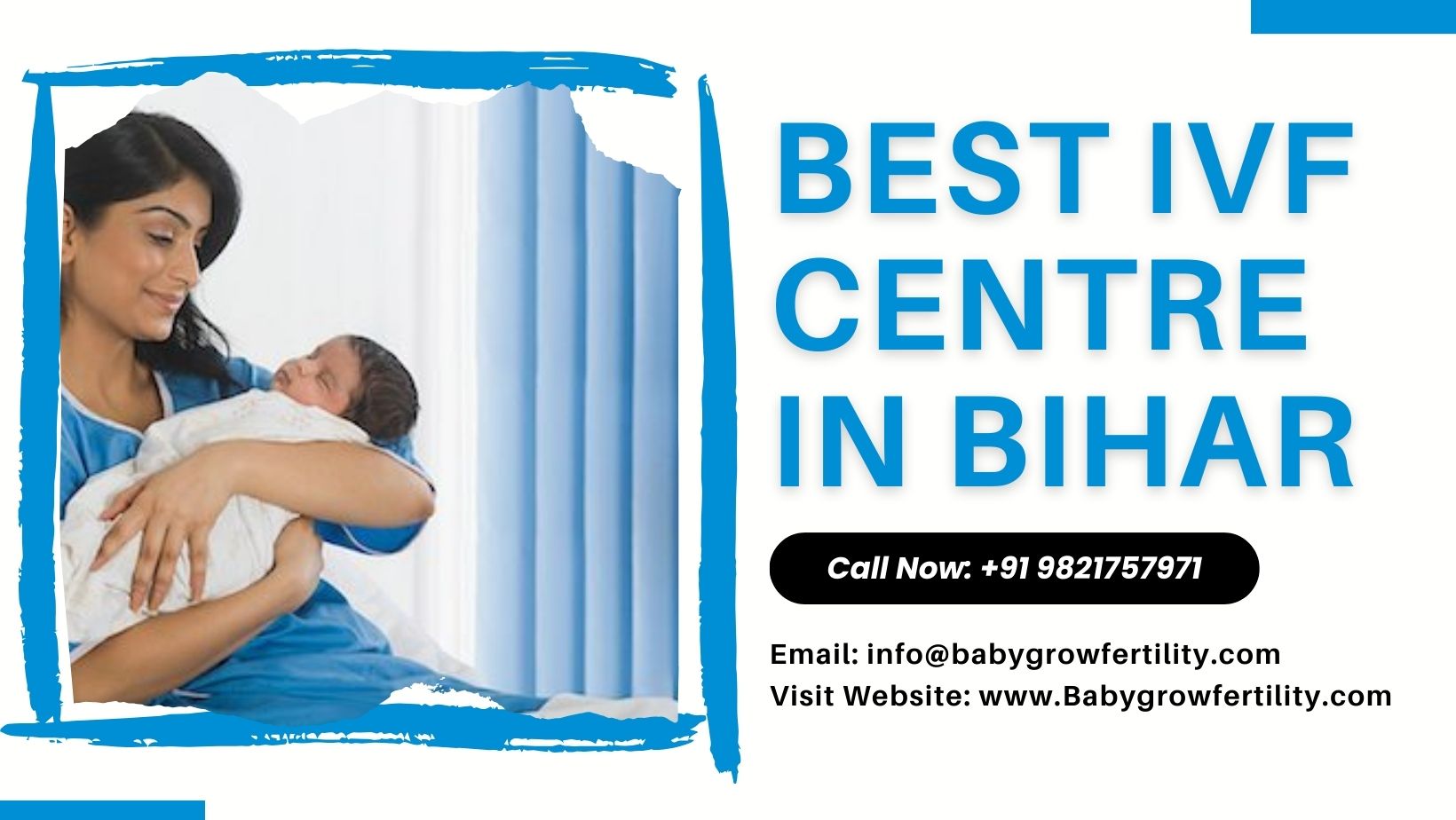Welcome to Baby Grow Fertility, your trusted partner in the journey towards parenthood. As you navigate the complexities of infertility treatments, finding the best IVF Centre in Bihar is crucial for achieving your dream of starting a family. At Baby Grow Fertility, we understand the significance of selecting a reputable and reliable fertility center to embark on this transformative journey.
In Bihar, where access to advanced reproductive technologies is essential, our commitment to excellence sets us apart as the Best IVF Centre in Bihar. With state-of-the-art facilities, a team of experienced fertility specialists, and a compassionate approach to patient care, we strive to provide unparalleled support and guidance at every step of your fertility treatment.
Whether you’re exploring in vitro fertilization (IVF), intrauterine insemination (IUI), or other assisted reproductive techniques, Baby Grow Fertility offers personalized treatment plans tailored to your unique needs. Trust us to be your partner in fertility, as we work together towards realizing your dream of parenthood.
Understanding Infertility
Infertility is a condition characterized by the inability to conceive despite regular, unprotected intercourse for at least one year. In vitro fertilization (IVF) is a type of assisted reproductive technology (ART) commonly used to address infertility issues.
What is IVF?
In vitro fertilization (IVF) is a medical procedure where eggs are retrieved from a woman’s ovaries and fertilized with sperm in a laboratory setting. The resulting embryos are then transferred to the woman’s uterus with the aim of achieving pregnancy.
Why IVF is an Option
IVF is often considered when other fertility treatments have failed or when certain infertility factors make natural conception difficult. It offers hope to individuals and couples who are struggling to conceive by providing them with a viable alternative to traditional methods.
Causes of Infertility
Infertility can be caused by various factors affecting either partner or both. Common causes include hormonal imbalances, ovulation disorders, tubal blockages, sperm abnormalities, age-related decline in fertility, and conditions such as endometriosis or polycystic ovary syndrome (PCOS).
When to Consider IVF
IVF may be considered as a treatment option when other fertility treatments have been unsuccessful or when certain infertility factors make natural conception unlikely. It is also recommended for individuals or couples facing specific challenges such as tubal blockages, severe male factor infertility, or advanced maternal age. Ultimately, the decision to pursue IVF should be made in consultation with a fertility specialist based on individual circumstances and medical history.
Overview of IVF Process
IVF is a complex process involving several key steps to achieve pregnancy. Here’s a breakdown of each stage:
Initial Consultation and Evaluation: The IVF process typically begins with an initial consultation with a fertility specialist. During this consultation, the medical history of both partners is reviewed, and any necessary tests are conducted to assess fertility potential. The fertility specialist discusses the IVF process in detail, addressing any questions or concerns the couple may have.
Ovarian Stimulation: Once the initial evaluation is completed and the couple decides to proceed with IVF, the woman undergoes ovarian stimulation. This involves taking fertility medications to stimulate the ovaries to produce multiple eggs. Regular monitoring through blood tests and ultrasound scans is conducted to assess follicle growth and hormone levels.
Egg Retrieval: When the follicles reach the appropriate size, a trigger shot is administered to induce final maturation of the eggs. Approximately 36 hours later, the eggs are retrieved from the ovaries using a minimally invasive procedure called transvaginal ultrasound-guided egg retrieval. The eggs are then transferred to the laboratory for fertilization.
Fertilization and Embryo Development: In the laboratory, the retrieved eggs are combined with sperm from the male partner or a donor through conventional IVF or intracytoplasmic sperm injection (ICSI). Fertilization occurs when sperm successfully penetrates the egg, forming embryos. The embryos are cultured in the laboratory for several days, during which time they undergo cell division and development.
Embryo Transfer: After several days of embryo culture, one or more viable embryos are selected for transfer to the woman’s uterus. The embryo transfer procedure is typically performed under ultrasound guidance and involves placing the embryos into the uterus using a thin catheter. The number of embryos transferred depends on various factors, including the woman’s age and embryo quality.
Pregnancy Test and Follow-Up: Approximately 10-14 days after embryo transfer, a pregnancy test is performed to determine if implantation has occurred. If the test is positive, further monitoring is conducted to confirm the viability of the pregnancy. This may include additional blood tests to measure hormone levels and ultrasound scans to visualize fetal development. If the pregnancy is successful, ongoing prenatal care is provided to support a healthy pregnancy. If the IVF cycle is unsuccessful, the couple may choose to undergo additional cycles or explore alternative fertility treatments.
Choosing the Best IVF Centre in Bihar
When choosing the Best IVF center in Bihar, consider factors such as success rates, patient reviews, clinic facilities, and personalized care to ensure a fulfilling fertility journey.
A. Researching IVF Centres
Researching IVF centres is a crucial step in finding the best one for your needs. This involves gathering information about the various centres available in Bihar, including their location, reputation, services offered, and success rates. It may also involve reading reviews and testimonials from past patients to get a sense of their experiences.
B. Factors to Consider
When choosing the best IVF centre in Bihar, there are several key factors to consider:
- Success Rates: One of the most important factors to consider is the centre’s success rates. This refers to the percentage of cycles that result in a successful pregnancy and live birth. High success rates indicate that the centre has a track record of achieving positive outcomes for its patients.
- Experience and Expertise: The experience and expertise of the medical team at the IVF centre are also crucial considerations. Look for centres with highly qualified fertility specialists who have extensive experience in performing IVF procedures. Experienced doctors and embryologists are better equipped to handle complex cases and maximize the chances of success.
- Technology and Facilities: The technology and facilities available at the IVF centre play a significant role in the success of treatment. Choose a centre that is equipped with state-of-the-art equipment and facilities for diagnostic testing, egg retrieval, embryo culture, and embryo transfer. Advanced technology can improve the accuracy and efficiency of IVF procedures, leading to better outcomes.
- Patient Care and Support: The level of patient care and support provided by the IVF centre is another important consideration. Look for centres that prioritize personalized care and support throughout the treatment process. This includes comprehensive pre-treatment counseling, ongoing emotional support, and access to resources such as support groups or counseling services.
- Cost and Affordability: Cost is a significant consideration for many individuals and couples undergoing IVF treatment. While cost should not be the sole determining factor, it is important to choose a centre that offers transparent pricing and affordable treatment options. Consider factors such as consultation fees, procedure costs, medication expenses, and any additional services or packages offered by the centre.
Baby Grow Fertility (Best IVF Centre in Bihar)
Welcome to Baby Grow Fertility, recognized as the best IVF center in Bihar, where we are dedicated to fulfilling your dreams of parenthood. With a steadfast commitment to excellence and compassion, we strive to provide comprehensive and personalized fertility care to every individual and couple who walks through our doors.
At Baby Grow Fertility, we understand the emotional and physical challenges that come with infertility. That’s why our team of experienced fertility specialists, embryologists, and support staff work tirelessly to offer cutting-edge reproductive technologies and evidence-based treatments. From in vitro fertilization (IVF) to intrauterine insemination (IUI) and beyond, we tailor our services to meet your unique needs and circumstances.
Beyond medical expertise, we prioritize open communication, empathy, and support throughout your fertility journey. Our goal is to empower you with knowledge, guidance, and hope as you navigate the path towards parenthood. Trust Baby Grow Fertility to be your partner in realizing the dream of having a family.
Cost of IVF in Bihar
The Cost of IVF in Bihar typically ranges from INR 80,000 to INR 1,50,000 per cycle. This estimate covers basic IVF procedures, including ovarian stimulation, egg retrieval, fertilization, embryo transfer, and initial consultations. However, additional expenses may arise for supplementary procedures like ICSI or PGD, along with medications, diagnostic tests, and consultations. It’s crucial for individuals or couples considering IVF to inquire about all potential costs upfront to ensure transparency and informed decision-making throughout their fertility journey in Bihar.
Conclusion
In conclusion, selecting the Best IVF center in Bihar is a significant decision on the path to parenthood. With a range of options available, it’s crucial to prioritize factors like success rates, expertise of the medical team, range of services offered, and patient satisfaction. By thoroughly researching and considering these aspects, individuals and couples can make informed choices that align with their needs and goals. Whether it’s baby grow fertility Clinic, Chachava Clinic, or another reputable center, the key is to find a facility that provides personalized care and support, ultimately maximizing the chances of a successful IVF journey.
Frequently Asked Questions (FAQs)
A. What is the success rate of IVF?
Ans: The success rate of IVF can vary depending on various factors such as age, cause of infertility, and the quality of the IVF centre. On average, the success rate of IVF ranges from 40% to 50% per cycle for women under 35 years old, with the success rate decreasing with age.
B. How many cycles of IVF may be needed?
Ans: The number of IVF cycles needed varies for each individual or couple and depends on factors such as age, underlying fertility issues, and response to treatment. While some individuals may achieve success with one IVF cycle, others may require multiple cycles to achieve a successful pregnancy.
C. Can IVF guarantee a healthy pregnancy?
Ans: While IVF significantly increases the chances of pregnancy for many individuals and couples struggling with infertility, it cannot guarantee a successful outcome or a healthy pregnancy. There are various factors that can affect the success of IVF and the health of the pregnancy, including age, underlying health conditions, and lifestyle factors.
D. How long does the IVF process typically take?
Ans: The IVF process typically takes around four to six weeks to complete, although this can vary depending on individual circumstances and the specific protocols used by the IVF centre. It involves several stages, including ovarian stimulation, egg retrieval, fertilization, embryo development, and embryo transfer.
E. What should I expect during the embryo transfer process?
Ans: During the embryo transfer process, a catheter is used to transfer one or more embryos into the woman’s uterus. The procedure is usually quick and painless, similar to a Pap smear. After the transfer, the woman may be advised to rest for a short period before resuming normal activities.
F. How soon after IVF can one take a pregnancy test?
Ans: Most IVF centres recommend waiting about two weeks after the embryo transfer before taking a pregnancy test. This allows enough time for the embryo to implant in the uterus and for the pregnancy hormone (hCG) to be detectable in the woman’s urine or blood.
G. What happens if IVF is unsuccessful?
Ans: If IVF is unsuccessful, it can be emotionally challenging for individuals and couples. Depending on the specific circumstances, the fertility specialist may recommend additional diagnostic testing to identify any underlying issues or adjustments to the treatment plan for future cycles. Counseling and support services may also be available to help individuals cope with the emotional impact of unsuccessful IVF cycles.




